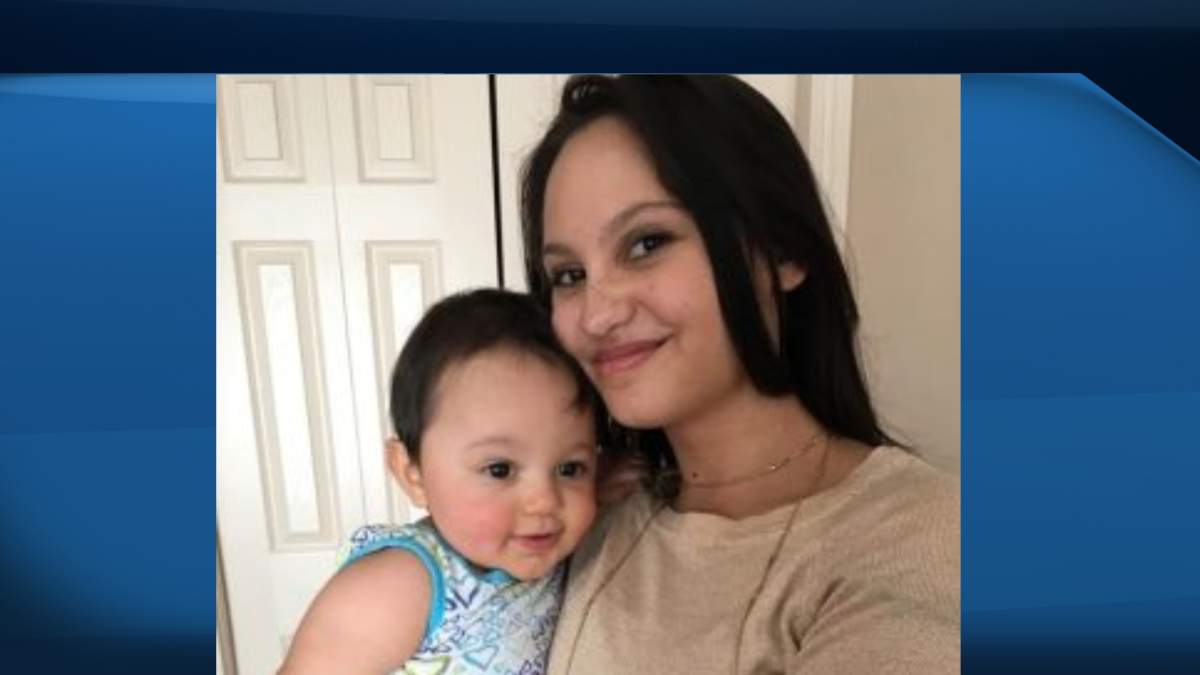Family members of a mother and her young daughter who were killed and buried in a shallow grave west of Calgary say they have struggled with fear and overwhelming pain since their deaths.

They made the comments in victim impact statements that were read into the record today as part of a sentencing hearing for Robert Leeming at the Court of Queen’s Bench in Calgary.
Leeming, who is 37, had pleaded guilty to the second-degree murder of Jasmine Lovett, but not guilty in the death of 22-month-old Aliyah Sanderson.
Their family members detailed fear, anxiety and pain in their submissions to the court.
“Torture is the only word I can think of to describe how it feels to lose a loved one because they were the victim of neglect or homicide,” Jodi Sanderson, Aliyah’s paternal grandmother, said through sobs.
“The pain is overwhelming, sometimes making it difficult to concentrate. Memories that once made you happy can cause waves of grief because they remind you will never make memories with them again.”

Kim Blankert, who is Lovett’s mother and Aliyah’s grandmother, said in a written statement that she has had flashbacks, nightmares and problems sleeping since their deaths.
She said she also is also fearful that Leeming will contact her or another member of her family.
Jenavie Lovett said in her statement that she’s also dealing with depression, anxiety and fear.
“There are no words that can begin to describe the amount of pain and sadness I feel over the death of my sister Jasmine and my niece Aliyah,” she wrote in her statement. “This loss has affected my entire family and will be something we carry with us for life.”
Leeming testified he was looking after Aliyah in May 2019, when she fell down some stairs in his Calgary home. When he checked on her later, he found her limp and unresponsive, he said.

Get breaking National news
He said he snapped when Lovett accused him of doing something to her child and he struck the woman several times with a hammer before shooting her in the head with a rifle.

Their bodies were found in a shallow grave in Kananaskis Country, west of Calgary, after they had been missing for weeks.
Leeming must serve an automatic life sentence for the second-degree murder convictions, but arguments were also heard Tuesday about when he should be eligible for parole.
Crown prosecutor Doug Taylor said Leeming should serve at least 15 to 20 years for Lovett’s death and longer — closer to the maximum of 25 years — for the toddler’s death.
“There is little doubt as to the motive of Aliyah,” he said. “Aliyah was killed second in time and it amounts … to approaching first-degree murder.”
Taylor said Leeming became a “de facto caregiver” to the toddler after the murder of her mother.
“The facts as a whole suggest Aliyah was killed as a form of collateral damage,” he said. “I don’t use that term lightly, but the only way to cover up the murder of Jasmine was to also murder Aliyah.”

Leeming’s defence lawyer, Balfour Der, asked for parole eligibility to be set at 20 years.
“This hearing … is not about when Mr. Leeming can be paroled, it’s simply about when he can ask,” he said. “It is then up to the Parole Board to determine when he can be paroled.
“He will only succeed in getting parole if he has reformed himself, that he is no longer a danger.”
Der said it’s difficult to predict the future now.
“There’s no way to know what Mr. Leeming will be like in 20 years,” he said. “Twenty years … is not lenient either.”
Justice Keith Yamauchi reserved his decision until a date can be set for early November.
“This is not something I take lightly,” he told the lawyers. “I have to consider Mr. Leeming, I have to consider the victim impact statements and these very important cases … to come to what I consider to be the right decision, a fit and proper sentence.
“To repeat, the sentence is life in prison. The question is a subset of that, which is when he can apply for parole.”
The case is to be back in court on Sept. 16 to set a date for Yamauchi’s decision.













Comments
Comments closed.
Due to the sensitive and/or legal subject matter of some of the content on globalnews.ca, we reserve the ability to disable comments from time to time.
Please see our Commenting Policy for more.